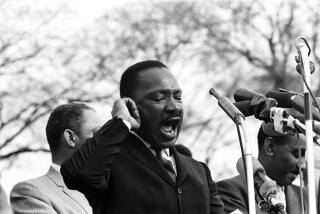Constant Reader : HEARTS IN ATLANTIS By Stephen King; Scribner: 528 pp., $28
- Share via
I saw the movie “Carrie” one evening in 1976. I was drawn to the troubled teen with parental problems, no friends and the longing to be accepted. I identified with the meanness of her peers, the thoughtlessness of the immature and the enraged impulse to strike out against those who hurt us. The fact that the young lady happened to have the ability to move objects with her mind was almost incidental to the story--until the end. The next day, I found the novel on which the movie was based at the bookstore and began devouring Stephen King’s works. Over the years, as that space in the bookstore has grown from one shelf to two, three and more, so has the number of days and late nights (with lights on) that I have spent reading Stephen King.
One of the most prolific writers of the modern era, King engages readers and talks directly to them, in such gems as “The Stand,” “Different Seasons” and “The Green Mile.” His new book, “Hearts in Atlantis,” consists of five interlocking stories about Vietnam. The first and longest of the stories, “Low Men in Yellow Coats,” is the foundation for the following four. It takes place mostly during the summer of 1960. Eleven-year-old Bobby Garfield lives with his embittered mother, a woman widowed young who doesn’t have a clue how to love her son or how to get out of a job in which her work skills are not considered her best attributes. Bobby has two best buddies, Carol Gerber (more than just a buddy) and John Sullivan (whom they call “Sully John”), who grapple with their own highs and lows that summer. Thrown into this mix is a strange old man, Ted Brautigan, who becomes Bobby’s first adult friend. Ted gives Bobby a copy of William Golding’s “Lord of the Flies.” It becomes Bobby’s bible, helping him grope with the realities of good versus evil, the monstrosity of the human spirit and the improbabilities of salvation or redemption. This is King at his best: exploring and understanding the pains of the young played against the flaws of the old with their inability to always protect and defend. Although King is a master of monsters and supernatural beings, there’s little of the paranormal in “Hearts,” which is more akin to “The Shawshank Redemption” and “Stand By Me.” You almost wince at King’s inevitable touch of other-worldliness in the story and Ted’s hint of magic.
As Bobby and his friends grow and move on, the events of that summer dramatically and subtly affect the rest of their lives. The second story gives the book its title and begins in 1966. The war looms over young lives and college is the last safe haven. We meet freshman Pete Riley and friends, whose maintenance of a 2.5 grade-point average is likely the only thing standing between them and a Vietnamese rice field. But their extreme addiction to the card game Hearts threatens averages and lives. King describes well the exhilaration and desperation of being out of control. My freshman addiction was the game of whist, playing until the sun came up, sleeping through classes, helpless to stop playing despite escalating fear as the grades slipped.
Pete and company have more at stake than I did. But it’s the same choices and the same second chances. King’s gift of storytelling is rich. You know these kids, inside and out. These are not extraordinary people; just regular folks like us; as we were. Some will end up fighting; some will not. Some will have long lives; some will die young. Some are successful; some forever flounder. Some will be happy. Some go crazy. By the time the reader reaches the last story, set in 1999, you are grateful for that little bit of magic and what it gives to the lives of Bobby, Carol and Sully John, part of what King seems to regard as a lost generation.
In spite of his skill as a storyteller, King’s treatment of minorities is disconcerting in “Hearts.” In the past I have admired King as a novelist not of color who has not shied away from creating finely drawn characters of color. But here, the minority characters are stereotypically portrayed with derogatory terminology, depicted only in bad parts of town and shown as not too bright and violent or as shakedown artists. Other characters, however, are allowed deep levels of perfection and imperfection. It sets up a “them versus us” feel in “Hearts” that is not fatal but seems oddly out of place.
“The world had teeth and it could bite you with them any time it wanted.” The opening line of “The Girl Who Loved Tom Gordon” haunted me after learning of King’s serious accident this summer and as I read “Hearts.” What if his injuries had been worse? King’s fans can imagine the magnanimous comments of the critics if King had succumbed months before the release of his finest work, suggesting that he had just reached the heights of his literary maturity before his tragic premature demise, that the true voice of a generation is sadly now silent. Fortunately, King is still with us.*
More to Read
Sign up for our Book Club newsletter
Get the latest news, events and more from the Los Angeles Times Book Club, and help us get L.A. reading and talking.
You may occasionally receive promotional content from the Los Angeles Times.










